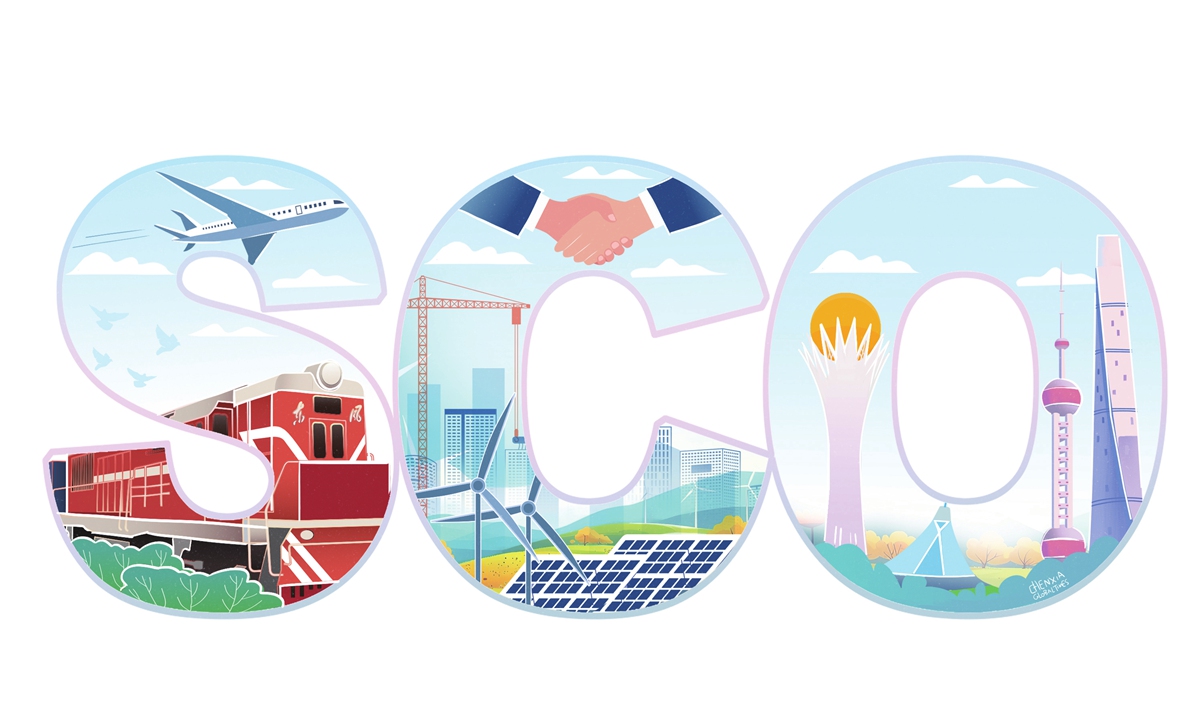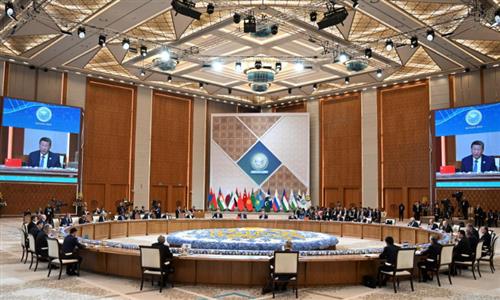
Illustration: Chen Xia/GT
The possible decline of the idea of states cooperating and creating international organizations is one of the greatest dangers facing us today. This threat is linked to the fact that the US and its allies have long seen all multilateral formats only in terms of their own interests. In recent years, this has largely paralyzed the work of the UN and European security organizations. It is therefore to be welcomed when sovereign states are able to work together on an equal footing in institutions that they themselves have created. One of the biggest examples of this is the Shanghai Cooperation Organization (SCO). Its summit took place this week in Astana, Kazakhstan.
Sixteen world leaders attended this year's summit. The SCO is now the regional organization with the largest territory and population in the world. Most importantly, it does not serve the interests and values of one of its participants, but upholds the "Shanghai Spirit": equality, mutual benefit and diversity. In this way, the SCO is an example of a new type of cooperation based on mutual benefit rather than imposing its will on the rest of humanity.
In the first phase of its activities following its establishment in 2001, the SCO has made a decisive contribution to the stability of the region. These achievements reflected the aspirations of the countries that founded the SCO, to make their common space free of internal interstate contradictions. Almost all the problems these states faced in their bilateral relations have now been resolved. But to achieve true harmony and prosperity, the countries of the region still have a long way to go.
The main task seems to be to make the geopolitical center of Eurasia invulnerable to external interference through joint development. It is precisely such intervention that has traditionally been seen in the West as a way of influencing the position of Eurasian states and their foreign policy. The SCO creates a Eurasian security space where mutual trust prevails. This is the most important achievement. It must be preserved and developed. Internal trust is also the most attractive feature of the SCO in the eyes of the outside world.
The participation in the summit of countries that are not yet members of the SCO proves that many countries see the SCO as a guarantee of their sovereignty. Therefore, today the SCO is creating a new international reality and solving the most important problem for all countries in the world: the protection of their independence in domestic and foreign policy. These ideas are expressed in the Astana Declaration, which reflects the position of the participating countries on key issues of development and security at the global level. The SCO Initiative on World Unity for a Just Peace, Harmony and Development was also presented. Through political and diplomatic means, it will launch a joint search for a formula for a just peace to ensure international security.
For the first time, UN Secretary-General António Guterres attended the summit. The UN remains the main institution of the international order, the preservation of which is a priority for Russia, China and the rest of the SCO countries. It seems important that the head of this organization should try to maintain a balance between those who defend the old international order and those seeking to create a new one. The new international order, unlike the old, will be the result of compromise. But the journey toward that compromise will be long and difficult and will involve many risks to international security. The participation of the UN Secretary-General in the summit is a confirmation of the high authority of the SCO in world affairs.
Cooperation in addressing the key development issues of the member states and preventing certain threats is the third area of SCO activity. To this end, the summit adopted the SCO Development Strategy until 2035 and the Strategy for the Development of Energy Cooperation until 2030. The latter document is expected to provide new impetus and tools for cooperation in the fields of oil and gas, electricity and renewable energy. The Cooperation Program to Counter Terrorism, Separatism and Extremism for 2025-2027 and the SCO Anti-Drug Strategy for 2024-2029 were also adopted. For the future, it is important to develop cooperation in artificial intelligence and high technology.
The SCO provides an example of how member states can work together in three crucial dimensions: maintaining regional stability, strengthening the global order, and addressing practical issues of development and security. The SCO's activities and achievements show that if cooperation with Western countries is difficult now, it does not mean that cooperation is impossible in principle. The world is not heading toward uncontrolled chaos, and most states continue to seek to manage their relations in a civilized manner.
The author is a program director of the Moscow-based Valdai Club. opinion@globaltimes.com.cn


